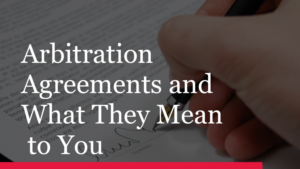
Often, a document that you sign accepting some benefit from your employer may contain an agreement to arbitrate some or all of your claims against that employer. To be enforceable, the language of the arbitration clause must clearly and specifically inform the employee on the following issues (a) that they are agreeing to arbitrate their claims in a private venue and not in court; (b) who will pay the fees for arbitration; (c) what entity, AAA, JAMS etc. will be selected for arbitration; (d) where the arbitration will take place; (e) how many arbitrators will serve on the panel; and (f) who will decide whether the arbitration clause itself is valid.
On January 25, 2021, in Henry Schein v. Archer and White Sales, Inc., the U.S. Supreme Court declined to issue a decision on issue (f) above despite already having granted certiorari and heard oral argument in October 2020. This leaves the Fifth Circuit Court of Appeals ruling in place which held where certain claims are exempted from arbitration in the arbitration clause, then a court decides the gateway question of whether the clause is valid and whether the claim must go to arbitration.
Why does this matter to you? Generally, employees desire to have their claims resolved through the courts, where they are entitled to a jury trial and where the process is cheaper, albeit much slower. Most employees are not even aware of arbitration clauses buried deep in their employment agreements or that an arbitration clause means that they don’t get a jury trial. Often, employees don’t realize that arbitration can be extremely expensive with filing fees many times more than a standard court filing fee of $450-$500. Further, employees don’t appreciate the implications of having your case decided by one finder of fact and that the selection of the arbitrator may not provide a truly neutral, unbiased perspective, considering the background of the arbitrator and their former practice areas. Note that arbitrators are generally large firm lawyers who have spent their careers defending companies against employee’s claims.
If you happen to see an arbitration clause in your employment contract before you sign it and ask for it to be removed, you will be told that the provision is not negotiable and must stand. The Supreme Court decision not to disturb the Fifth Circuit ruling is helpful to employees in that it makes the threshold decision of whether the arbitration clause is enforceable on your particular issue a question for the courts and not the arbitrator. Why is this important? Because you can imagine that an arbitrator is more likely to find that an issue must be submitted to arbitration before him or her than to be sent back to the court. Follow the money.
Employers greatly rely on arbitration clauses to keep claims against them out of the public view. While a Google search shows court claims filed against a company, the substance of those claims and the pleadings filed in that case, arbitration proceedings and filings are private and not publicly searchable. As a result, employers fight to have their arbitration clauses enforced, and because of the huge backlog in the court system, courts are more likely to punt their claims to arbitration to clear their dockets.
As an interesting consideration, Amazon recently removed its arbitration clause from its consumer contracts in response to a law firm filing 75,000 arbitrations against it. Amazon paid many millions of dollars in arbitration fees alone, making the business decision to remove its arbitration requirement. While other consumer contracts may follow suit, it is unlikely that employers will change their strategy just yet. Instead, you are likely to see employers tighten their arbitration language to avoid the implications of the Fifth Circuit’s decision.
The Bottomline: While you may not be able to remove the arbitration clause, the Fifth Circuit ruling may provide some relief to employees on this issue. Know what you are signing when you enter into an employment agreement and make sure you understand the implications of every clause contained in it. These provisions will have critical implications on your ability to raise a claim against your employer, the increased costs associated with litigation, and the prognosis of your outcome.

